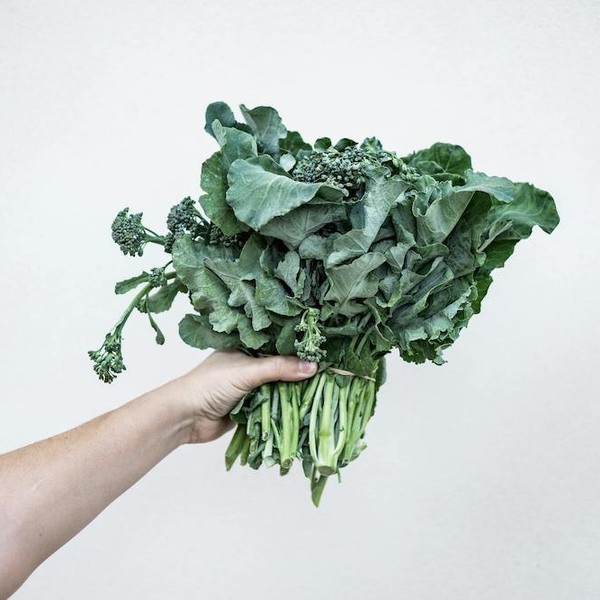These food waste prevention tips are mind-blowing!
8 Genius Hacks To Make Your Groceries Last Longer

Meredith Holser is B+C's resident affiliate writer. Meredith enjoys writing about a range of topics, but she's adopted e-commerce writing in all its many facets. Outside of work, you can catch Meredith hiking, trying new recipes, and dreaming about having a yummy little treat.
If you've had the experience of running by the closest Trader Joe's for some berries and witnessing them go bad in only a matter of days, you're not alone. Not only is this super frustrating, but you can't seem to figure out exactly how to prevent it each time it happens!
Worry no more! From keeping berries fresh and saving bread from molding to extending the life of the milk you bought last week, Becky Hardin, Founder and Recipe Expert at The Cookie Rookie has a solution. She's shared 8 genius food storage hacks to prevent food waste, which ultimately helps you save money and helps the planet.

Photo by Karolina Grabowska / PEXELS
1. Never keep your loaf in the fridge
Turns out, storing your bread in the fridge – where the temperatures are significantly cooler – can turn it stale quicker than if you kept it at room temp. Making use of a bread box or a cool, dry cupboard is much better for keeping it in tip-top shape, according to Hardin.
Additionally, she has a good tip for the slow bread-eaters out there: "Is sliced bread getting stale before you can finish the loaf? Pop it in the freezer! Take out a slice or two as needed, toast straight from frozen, and enjoy fresh-tasting bread every time."

Photo by Cottonbro Studio / PEXELS
2. Keep certain fruits and veggies separated
Certain fruits and veggies (like apples, avocados, and melons) naturally release ethylene gas, which can speed up the ripening process for other pieces of produce.
Hardin says the best practice to avoid expedited (and often unwanted) ripening is to store apples, avocados, and melons away from leafy greens, broccoli, and berries (which are especially ethylene-sensitive).

Photo by Alleksana / PEXELS
3. Wrap fresh herbs in damp paper towels
Herbs seem to be especially prone to wilting, no matter how you store them. To keep them crisp and flavorful for longer, Hardin wraps the bunches in damp paper towels before placing them in a resealable plastic bag or container in the refrigerator. So smart!
"If you try this and still don’t use them quickly enough, then try storing fresh-cut herbs in an ice cube tray with oil and freezing them into portions," she offers. "This works for fresh garlic, chili, and ginger, too."

Photo by Ivan Samkov / PEXELS
4. Vinegar-bathe your fruits and veggies
"Washing your fruits and vegetables in a mix of water and vinegar will remove bacteria and disinfect the produce, keeping it fresher for longer," Hardin says.
To do a vinegar bath, you'll mix a 1:3 ratio of vinegar to water in a large bowl and let the produce sit for about 15 minutes. Then, rinse them off and let them dry completely before storing them away in their respective places around the kitchen.

Photo by Marco Antonio Victorino / PEXELS
5. Keep potatoes, onions, and garlic out of the fridge
Contrary to what you might be doing already, potatoes, onions, and garlic don't belong in the fridge. They thrive (and keep fresh) better in "cool, dark places," says Hardin.
Be mindful that storing potatoes and onions next to each other isn't optimal for freshness either, since onions release ethylene gas, like the apples, avocados, and melons mentioned before. Separate them, and enjoy fresh taters for a lot longer than you may be used to!

Photo by Polina Tankilevitch / PEXELS
6. Add salt to your milk
Another trick Hardin offers is adding salt to your milk to keep bacteria from growing. The salt acts as a preservative!
"When you first open your milk, add a pinch of salt, give it a good shake, and place it in your refrigerator as soon as possible," she says. "Ensure you're also using the coolest areas of your fridge to keep your milk fresh."

Photo by Kevin Malik / PEXELS
7. Follow the first in, first out (FIFO) rule
Most of us who've worked in food service know about the FIFO rule: first in, first out. This means trying to use the oldest products first to avoid unnecessary food waste.
"When restocking your pantry or refrigerator, move older items to the front and place newer items in the back," Hardin says. "This encourages you to use up older ingredients first, reducing the likelihood of them expiring before they're used."

Photo by Anna Shvets / PEXELS
8. Remove groceries from their packaging
Unpacking certain groceries can help extend their shelf live by a lot.
"Removing foods from their original packaging into specialized storage solutions like produce savers can lengthen the shelf life such as strawberries, other fruits, and even cheese," Hardin says. "Additionally, try adding a paper towel to absorb the moisture from berries and salads."
Subscribe to our newsletter for more tips on sustainability!
Lead photo by Michael Burrows / PEXELS.



















